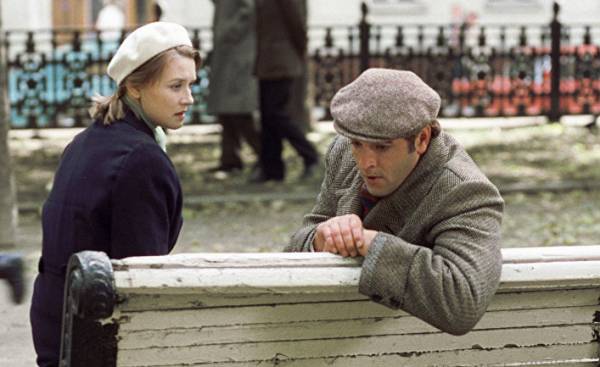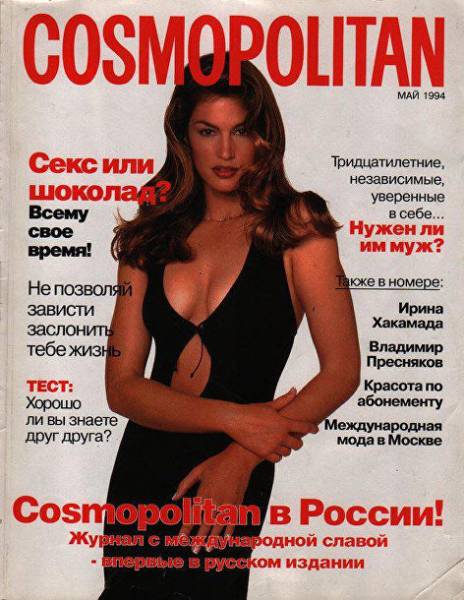
In the mid-nineties, making the daily journey from home to school, I often stopped at a newspaper stall in the metro. Not that I wanted to buy something — rather, I was fascinated by the changing, like a kaleidoscope, the range of publications. One after another, cover with powerful women and less powerful cars push out issues of “Truth” out in the back row until it disappeared completely there, crushed, “AIDS-info”. Where once grayish editorial urged Soviet women and men to devote every minute of their life productive work in the factory halls and on the collective farms, Cosmo and ELLE is now called women and men to new feats — for the most part, in the bedrooms or, at worst, behind the screen in a communal room. “Sex or Chocolate? All the time!” spoke the first Russian Cosmopolitan to the nation, who barely had time to stop to measure out the life of five-year plans. Along with this, Cosmo questioned the need for her husband of a successful woman’s life, and offered a test “How well do you know your partner.”
With the collapse of the Soviet Union, the former Soviet people once again became the object of “reforging” — this time from the fatalistic collectivist Homo Sovieticus into an emotional capitalist, which measures the quality of the marriage on a scale of one to ten, practiced “25 comfortable sexual positions for a clamshell” and able to defend their “emotional needs” in the communal kitchen. Suddenly, right in front dissipated like smoke, the dictionary of the passion. Tolstoy and Dostoevsky said, “love” — and Ellen and the guys on TV said “relationship”; mom said “groom” and we said “man”; and, finally, where all the intelligent people shrugged and blushed, Cosmo said “cunnilingus”, “fellatio”, “Fisting” and “orgasm.” He changed the usual course of relations: instead of “met” — “love” — “got married”, we’ve now learned to “set personal boundaries”, “to give partner the chance” and then “engage”.

Well studied and criticized in the West for the “consumer” attitude to the senses in Russia emotional capitalism, however, still faces serious resistance from the “emotional socialism”. The so-called “therapeutic” language of Western love is the language of pop psychology and self-help that describes emotions as a measurable, knowable and controlled — often interrupted by the language of the Russian classics: thunder, lightning, comets and blizzards.
About what happens in the process of “civilizational clashes” I spoke with Julia Lerner — sociologist, doctor of Sciences, Professor of the University Ben-Gurion in Israel and the former Petersburger, which has proposed the concept of “emotional socialism” in his work on the emotional language in the mass media.
Between “love” and “relationship”
– Julia, how did you come to the topic of “emotional socialism”? You yourself once experienced the clash of these “Soviet” “Russian” ideas about feelings, about love from the West?
I moved to Israel when I was 18 years old, at the peak of the beginning of a romantic relationship, and of course, I was looking for love. I was in love with Israel, I was in love with the language and I wanted to have relations with the Israelis. But I absolutely was not ready as a first romantic encounter. I heard from an Israeli young man, for example, is an expression of type “I cannot do that”, in Hebrew sounds like “Le matim Li”. And I absolutely could not understand what it means, why he said that to me, and what the development of relations assumes that the type will call or not call then? I understood Hebrew, but that expression was for me a complete stranger.
What is in this “Le matim Li”? There is, first, a clear and stand-alone Ya And I have some of his emotional needs, he has a clear idea of what and who suits him, and who is not. It sounds corny, but he came to the supermarket, and there are different women, and he chooses — but just can’t decide, so he tries, and after the first or second meeting, after sex he says no, that is not, and this — Yes, maybe. And he’s absolutely in this sense does not think to hurt me. He’s got Ya this I have needs. This Yigal, OMRI, tune — they know and is constantly studying, and so it seems that it’s not. I just do not fit him — but it’s about me says nothing. I mean, I’m not here at all in this whole picture. And most importantly, after the person tells you “Le matim Li”, you have absolutely nothing to say. The whole romantic scenario to achieve someone- it doesn’t work perfectly. Because how are you going to achieve it? To change it needs? To change yourself to fit?
– In the Russian version love to love what you. And it doesn’t make you an unhealthy person. It just emphasizes your humanity. In the Western model, if you love what you don’t, it’s mean that you are neurotic?
— Yes, it is. But the difference is felt even when people come to the conclusion that they each other “suits”. When I was already married to an Israeli, we are still in a completely different looked at what we had. I was in the model of love, where there are laws. First and foremost, she’s the love is either there or it is not. And he was “in a relationship” on which you can and should “work”. Interestingly, despite the fact that the Soviet people working on them in different areas, all in the Russian discourse on the love to work. It is beyond that.
In General, the therapeutic management of emotions is an illusion. Because, in fact, nothing you choose. You will adapt yourself and your behavior under a healthy standard. You know, when I’m in America I spent a year, I had all the time I have the feeling that everything is built on cultivating the feeling that you have a lot of choice. In order for you in any case did not think, did not think that no you have no choice. So you will endlessly ask paper bag or plastic bag — need you to have the feeling that you are already suffocated by this choice.
– How we are free to love, do you think? We live in this paradigm, we suffocate this choice, as you say, but how is it really?
We are now limited to romantic love, right? To a stranger, another man, who suddenly, for reasons of fate or your own choice, or because it meets your needs becomes for you something significant and you want to be with him, to spend time with him, to touch him — here in this sense?
To me, freedom is not a relevant question in relation to this experience. It seems to me that love of this kind, attachment kind — she initially denies her freedom, she believes addiction. She suggested a compromise. Just in the Russian model always, as a rule, a compromise will go a woman, not a man. But on the whole, freedom can only be FROM her, FROM love, but this freedom is for me it is associated with unhappiness and emptiness.
Lose your head or lay your soul?
– What is emotional emotional socialism and capitalism? They actually exist?
— Let’s start with the capitalism — it is better described and understood. Emotional capitalism is a very General term that tries to describe the product of interaction between different economic forces, the larger cultural narratives and social institutions. It is the fusion of the psychological discipline and its practices, market capitalism, and the main life scenarios of American culture. Here the Protestant spirit, and individual autonomy, and endless ideology of choice. Here is the merge — this is the emotional capitalism.
Emotional socialism is also alloy, generated by different phenomena existing in the same historical period. First, it is economic and value system of socialism — the principles of collective ownership and of community service. Secondly, it is a vital scenario, the Russian, or rather Russian culture at the heart of which lie the norms of literature of the XIX century. In addition, there are Orthodox and of course, all that Soviet ideology had to say about the feelings and privacy. In this sense, emotional socialism is not devoid of Russian-ness as well as emotional socialism is not devoid of amerikanskoi. So when I say emotional about socialism, I do not lose sight of prevailing the role of Russian literature and the Russian language. That is, it is possible to work with the concept of emotional socialism and Cuba, and China, perhaps, but there it will be different than in the former USSR.
To the “emotional socialism” as a reality, of course, should be treated critically. Any attempt to describe the culture of the “reverse” is fraught with simplification: we begin to see more differences and fewer similarities. When someone or something is perceived as Other, the Other quickly turns into an Absolute Other, turns into the complete opposite. That is, the emotional Russian style, Russian style of doing relationships, Russian type of love, therefore, begins to be interpreted as completely the opposite of American, Western and so on.
But I don’t think the Russian or Soviet emotional culture, something exotic that will be completely incomprehensible to the Frenchman, Englishman or American. Therefore, the concept of “emotional socialism” greatly simplifies the picture. For all that, the idea of emotional socialism seems to me to be proper and convenient for analysis. I see that in the post-Soviet space, people think differently and talking about their private lives, about their experiences. And it especially becomes apparent in the Russian-speaking immigrant areas, where there is a moment of direct Association and comparison.
– Let’s go back to the life script, which is emotional socialism. What are they like? And who are his heroes? What are their qualities? What tests did they have?
— Well, for example, I understand that the hero of the scenario of Russian literature — he suffers, and his suffering is its value. That is, deliverance from suffering is not his goal. In the modern — not to be confused with Freudian! therapeutic scenarios is the idea of deliverance from suffering. In the Russian narrative is not, in this pain and suffering not perceived as a hindrance, as something that makes life is wrong, not like it should.
Let me give you an example. Once I was doing for the Jewish Agency “dry” study about how to represent Israel to the rest, neuehavshimi Russian Jews, so they understand how they can be good. The first thing I decided to adopt a business strategy instead of ideological: these Jews probably have some unmet need, but Israel needs to be represented as the product that these needs will satisfy.
We did a huge amount of focus groups, and I saw that I was terribly surprised: people talking about their unresolved needs, but for them the change of place is not the way to resolve this problem. Most of them said in one form or another, to learn to live with these problems, to get used to it, get used to live in spite of them is more important, more valuable experience. It is for them the path of success. This does not mean that a million people left — but the articulation of the remaining such.
Here is another feature of emotional socialism is a place such thing as destiny, the order, circumstances. There is some balance of power or some path you go, and have to go through him rather than fight him. To adapt, not to change.
Actually, Homo Sovieticus, the Soviet man, often in Western literature and describe — as a slave to circumstances, do not have what in English literature is called “agency” — that is, self-determination, freedom of will, freedom to do things. Personally, I’m reading it seems totally simplistic and wrong, therefore I want to ask you: what is emotional freedom, emotional the will of man, brought up on an emotional socialism?
— Probably, in the freedom to lose your head from love, freedom to love crazy. Why in the Soviet literature, Soviet cinema was a cult of love? It was absolutely legitimate to make films about crazy love, about betrayal, about the care of the family.
It was as if some cultivated niche: the loss of head, freedom of emotional expression. But not for the purpose of “self-realization”, for example, but as an end in itself. The happiness it does not follow large authentic feelings. And anything good, as a rule, are not obtained. Maybe it is a kind of prison exercise yard. System which always keeps very hard, it still to exist, must create some niches where it is released.
Is obtained by Bakhtin: carnival, legalized lawlessness in the world of total control. Here is the freedom to lose your head has dark side: family violence, abandoned children, alcoholism and the highest per capita divorce rate among developed countries. “Lose your head” is the freedom or irresponsibility?
The question is normative and it offers a look at Russian and American love estimated. Intellectually thinking, I try not to believe that Russian love is folly and carelessness, and the us is responsible regulation that reduces the harm to themselves and others, or Vice versa, respectively — that is Russian, she is a true and deep, and the us programmed like a robot. Although in my own experience, I feel ambivalence, of my own consciousness and the language is very psychologized and perhaps, in the imagination of Russian emotions I’m trying to resist their full colonization
– Then let’s talk about the dark side of emotional capitalism? We have a mess, everything is clear. And they have that?
— I will give an example from your favorite movie “Cold souls.” There the main character is an American actor who plays in the play Uncle Vanya by Chekhov. For him this role is affected so much that he falls into a depression. And he discovers that in new York there is a firm that allows a person to get rid of his soul for some time or permanently, if it prevents him to live. He comes back, and there’s a terrific scene where he explains the purpose and procedure, and he takes back his soul to actually become happy. And it’s an amazing thing, because in Russian you cannot be happy without a soul. And you can’t be happy without her pain. And the American model — of course, exaggerated, exaggerated, a parody — person can be happy only without a soul. And this is the dark side of therapeutic culture.
But the most interesting thing that happens to the hero of this film, when he takes the soul. He really begins to function perfectly, he is in good mood and so on. But he can’t do two things: he can’t play, the art is not, and he can’t make love.
Emotional NEP
– How to change life scenarios in a post-Soviet culture? Where now people take idea how to Express their feelings, how to be with your emotions?
— There is a discursive shift. Unclear was where to take the sense in which these meanings are produced. I think that for a huge number of people blogging and Facebook is all they read. At the same time, social media is incredibly normative. It is clear that the place of classical literature as a supplier of life scenarios and, especially, emotional life, very much blurred.
The main life script today — is self-realization, personal growth. It is curious, however, that this scenario comes primarily through self-help and media, and not through professional psychology. Russia has a therapeutic culture but no culture appeal to the therapist.
In this self-help just the idea of freedom from love freedom from addiction is very popular. At the same time, she takes a very radical form, as in NLP. What do you explain this?
— Usually involves a situation in which sold well the breakdown of the old. Not correction and breakage. There are researchers who write that to understand the Soviet civilization will need is not through the economy, and the construction of a new personality type. The Soviet identity was done with an axe, but what you’re describing right now is to try the same axe to hack to death, along with her emotional socialism, and to build some supposedly new style. And yet when we analyze what is happening in the media discourse, in pop culture, we see there are a lot of Soviet.
– We see the format, communicate ideas the Soviet brand. The pressure and the goal is to destroy the old or someone else — exactly the same. I was just thinking, since we’re talking about emotional emotional capitalism and socialism that we now live in times of emotional of the NEP. Bukharin came to the workers and peasants, and said: “get rich!”. And that’s what makes post-Soviet self-help, which comes to the people and said: forward, dispose of your life, you don’t owe anyone anything! Own property for their needs. Not giving way old ladies in the subway. Getting married only for males, bringing not less than one hundred thousand of revenue per month. All these Vedic wives and geisha Blowjob from the course — this is typical of nepmany.
— This is a very interesting idea. But at the same time, I was thinking about the fact that you got into some kind of trap this omnipresent emotional capitalism. We catch the bait and learned his basic economic metaphor. For example, I recently went to University professional coaching program — this special man who was explaining to me how to grow in their profession. And she asked me: “how do you replenish your emotional Bank? Let’s see what your contributions what are the costs?”. And I tell her I don’t want to talk in such terms. I am your soul and your life is not perceived as a Bank and don’t want to translate her concept of “deposits.” And I’m not sure I should do this and it is right to write about the emotional lives of people, their experiences in terms of ownership, capitalism-socialism. Something is wrong in adopting this structure of thinking as fundamental.
– Let’s sum it up. What’s the main difference between love Russian love “Western”?
In the Russian model, if you don’t lose your head, you don’t really love, and such love will not bring you happiness. And in the us — if you lose your head, it is a sign that something is not right. There to be happy in love, you have to show and myself and partner that “I can without you.”







